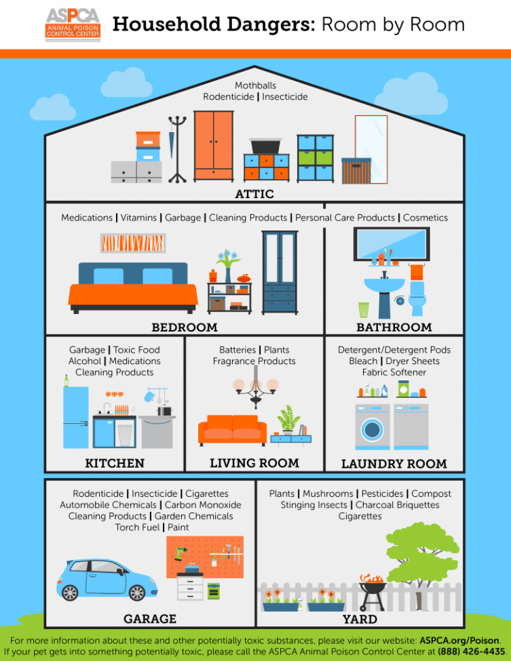We love our pets! Adopting and bringing a new companion into our lives is one of the best feelings. Most of us, when we bring our pets in, give them the go head to make themselves right at home. While this is a great way to form a relationship with our animals, it is also important to be sure our homes are ‘pet-proofed’ for our fur babies. The curiosity of our companions can lead them to trouble if potential hazards aren’t stored away from them.
Spring (and spring cleaning) is the perfect time to evaluate your home and make sure it is safe for your pets. The ASPCA released a list of the top 10 most common pet toxins found around the house. Take time to review this list and store any potential toxins out of your pet’s reach.
10) Garden Products – Items such as fertilizers and composts should be kept away from pets. As nice as it is to have them with you when you garden, make sure you’re keeping them safe too!
9) Plants – Plants like azaleas, daffodils, lilies, and tulips can be a threat to your pets. Make sure you look up any plant you may have to make sure they are pet friendly.
8) Insecticides – These can be just as toxic for your cuddly companions as they are for those pesky infestations. Keep them in a safe place your pets can’t get to.
7) Rodenticide – Much like insecticides, rodenticides are very toxic to pets. They are also designed to attract rodents and may attract your pets so it is important to keep them put away from your animals.
6) Household Items – Items like glue, cleaning products, and detergents can be highly toxic for your animals. If you’re not sure if it’s toxic, it is best to err on the side of caution and keep it away from your pets.
5) Veterinary Products – Many of the flavored medications that are intended for pets can entice them to eat more than the prescribed dose. Overdosing on these medications is very dangerous!
4) Chocolate – In 2017, approximately 48 cases of chocolate toxicity cases were reported. Don’t let your pets get into your chocolate stash!
3) Human Food – Just because we can eat it doesn’t mean our fur babies can. Watch out for items such as grapes, onions, xylitol, and avocados.
2) Over-the-Counter Medications – Human medications, herbal supplements, and vitamins can have a negative side effects for your pets. Never give them anything without consulting a veterinarian.
1) Prescription Medications – In 2017, over 34,000 animal toxicity cases reported were from prescription medications. Make sure to store these in a safe place away from your pets.
While symptoms can vary and include many other signs, some of the most common symptoms of pet toxicity include: vomiting, diarrhea, seizures, lethargy, drooling, and weakness. If you know or suspect your pet may have ingested a toxin, it is important to act immediately. It is important to seek immediate veterinary assistance. If you cannot immediately get veterinary care, contact the Animal Poison Control Center (APCC) at 888-426-4435.
Make sure to keep your pets happy, healthy, and safe this spring!

